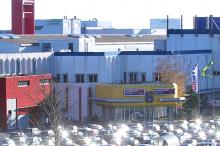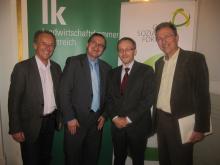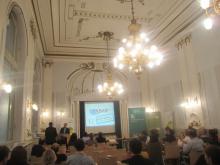Alarming Land Consumption
In Austria, on an average 20 hectares of arable land and grassland are obstructed a day. This corresponds to a cultivated space of an average farm. Experts therefore demand an amendment of land use regulations, and an increased cooperation between municipalities in building projects.
It is nearly exclusively a matter of particularly high-quality agricultural soils in favourable conditions, which are abandoned to sealing, stated the President of the Austrian Chamber of Agriculture, Gerhard Wlodkowski, on Thursday concerning the topic of land consumption in Austria.
15 per cent already "consumed"
The annual consumption of land in Austria is higher than average, compared with EU ratios. According to the Chamber of Agriculture, arable land in Austria has decreased in the past 50 years by 300,000 hectares, and grassland by 570,000 hectares. Per year, this corresponds to the town of Salzburg. At the same time, the existence of vacant industry and trade space is increasing, which might cover around one third of the annual demand for land.
Only one third of the total area of Austria is suited for obstruction.
Only approx. one third of the total space of the mountainous land of Austria is suited as a permanent settlement area. On a federal scale, 15 per cent thereof have already been "consumed". "Nowadays, around eleven hectares of arable land are daily used for traffic, industry, economy and living space, and thus are permanently used in a different way. If leisure and mining areas are added, this amounts to more than 20 hectares a day", states Wlodkowski.
Negative effects
Increasing obstruction bears negative effects on the environment and climate. Fields and meadows fulfill a large number of functions, such as regulation of the natural household, they are a habitat for animals and plants, and offer a large number of protective effects, such as water detention and storage. They serve for the maintenance of biodiversity and storage of carbon, and last, but not least they are living and recreational space for man.
"Take a look first"
"Any sealing of soil, the CO2 storage tank, accelerates climate change, i.e. global warming, and the danger of thunderstorms increases. For this reason a slowing-down of land consumption is ‘urgently required'", says Kurt Weinberger, Chairman of the Board of the Austrian hail insurance.
Gerlind Weber of the Institute of Spatial Planning at the University of Natural Resources and Life Sciences, Vienna pleads for an amendment of land regulations of provinces and municipalities in the Oe1 12 o'clock broadcast. In building, space should be saved and existing areas should be used more efficiently, instead of obstructing grassland all the time. "First take a look, what do we have, and only then go to the meadow for an expansion of settlement. Currently, it works the other way round", stated Weber.
Budgetary strains for municipalities
Unfortunately, efficient building is often impeded on account of political motives, municipalities make their mark by means of new building projects, stated Weber. "The stronger the competition among municipalities, the more compliance of municipalities with respect to offering corresponding premises, which, however, do absolutely not comply with the rule of land saving."
"An active spatial policy is crucial, not only for ecological reasons", emphasized the President of the Eco-Social Forum, Dr. Stephan Pernkopf. Increasing splinter development in municipalities leads to heavily increasing costs on the one hand. Compact settlement structures, on the other, are a strong relief for the municipal budget.
Berlakovich for cooperation
Minister of the Environment, Nikolaus Berlakovich (Austrian People's Party) does not believe that municipal policy fails. There is an awareness that land consumption must be cut down, said the minister. Spatial regulations would already be amended correspondingly. "There are some positive examples of all provinces, how to achieve space-saving spatial planning, which reduces consumption of resources and energy consumption."
Berlakovich requests increased cooperation between municipalities in building projects in the future, in order to save grassland. "Soil shall be cultivated in common, used efficiently, within the meaning of residential building, but also creating economic zones." BOKU expert Weber agrees that such cooperation makes sense.
Links:
Austrian Chamber of Agriculture www.agrarnet.info
Austrian hail insurance www.hagel.at
University of Natural Resources and Life Sciences www.boku.ac.at
Austrian Ministry of Environment www.lebensministerium.at
Published on 12/13/2012
Dr. Erwin Szlezak presented the SONDAR projects within the framework of the meeting of the Austrian Chamber of Agriculture:
04.11.2025
EUSDR PA10: 12th Danube Participation Day in Sarajevo
more ...07.10.2025
CatchHedge - Potenziale von Hecken im Zeichen des Klimawandels
more ...16.+17.09.2025
32nd Conference of the Danube Region
more ...12.09.2025
Grundlagen der professionellen Bio-Mandel-Produktion
more ...10.09.2025
Agroforst u. Marktgärtnerei, Symbiose
more ...05.09.2025
Regionales Wiesensaatgut gewinnen mit dem Wiesensamenernter
more ...25.06.2025
Feldtag - StripTill im Bio-Mais im Trockengebiet
more ...25.06.2025
Seminar: Wildbienen- und Nützlingsförderung im Biolandbau
more ...24.06.2025
BOKU Green Plate Forum 3.0
more ...24.06.2025
Die Maulbeere - Kultur, Produktion u.Verwendung
more ...17.06.2025
Frühjahrstagung Österr. Gesellschaft für Agrar- und Umweltrecht (ÖGAUR)
more ...13.06.2025
Seminar: Artenvielfalt in Ackerbauregionen fördern
more ...03.06.2025
Seminar: Keine Angst vor der Ackerdistel
more ...03.06.2025
Agroforstsysteme: Anbau-Modelle der Zukunft
more ...20.05.2025
IDM-Generalversammlung 2025
more ...15.05.2025
Seminar: Unkräuter/Beikräuter erkennen und als Zeigerpflanzen nutzen
more ...13.+14.05.2025
Bodenforum Österreich - Frühjahrstreffen
more ...04.05.2025
Tageskurs: Perma-Veggies - Mehrjähriges Gemüse und essbare Stauden
more ...03.05.2025
Waldgärten-Exkursion
more ...08.04.2025
Agroforst: Traditionelle Systeme von Land- und Forstnutzung verbinden
more ...





